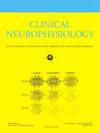Working memory deficit in patients with focal epilepsy is associated with higher interictal theta connectivity
IF 3.7
3区 医学
Q1 CLINICAL NEUROLOGY
引用次数: 0
Abstract
Objective
Interictal cognitive disturbances are frequent in patients with focal epilepsies and the links with alteration of resting state brain oscillations are not well known. Changes in theta oscillations, may contribute to cognitive impairment. This study aimed to investigate whether changes in theta activity are related to cognitive disturbances.
Methods
Retrospective data of 23 patients with temporal/frontal lobe epilepsy were included. Theta connectivity, power and interictal spikes rate from five-minute interictal resting state stereoelectroencephalography datasets were computed. Cognitive performances were assessed by Wechsler Intelligence Scale (WAIS-IV) and Weschler Memory Scale (WMS-III). Linear regression was performed to evaluate effect of interictal activity and seizure related parameters on cognitive scores.
Results
WAIS-IV working memory score in patients with epilepsy showed negative correlation with frontotemporal theta connectivity (F(1,17) = 5,239, p = 0,036, R2 = 0,200, β = -0,497). Moreover, theta connectivity was correlated with mesial temporal spike rate and theta power (F(2,17) = 10,967, p = 0,001, adj.R2 = 0,540).
Conclusions
Patients with focal epilepsy often encounter compromised cognitive functions, particularly notable in the domain of working memory. This impairment might be attributed to physiological mechanisms involving increased theta connectivity within the frontotemporal regions and interictal spiking.
Significance
Our study highlights the relation between theta connectivity and working memory impairments in patients with focal epilepsy.
局灶性癫痫患者的工作记忆缺陷与较高的间隔波连通性有关。
目的:局灶性癫痫患者常发生间期认知障碍,其与静息状态脑振荡的关系尚不清楚。振荡的变化,可能导致认知障碍。这项研究旨在调查θ波活动的变化是否与认知障碍有关。方法:回顾性分析23例颞叶/额叶癫痫患者的资料。计算5分钟静息间期立体脑电图数据集的Theta连通性、功率和间期尖峰率。采用韦氏智力量表(wis - iv)和韦氏记忆量表(WMS-III)评定认知能力。采用线性回归评估间歇期活动和癫痫发作相关参数对认知评分的影响。结果:癫痫患者的WAIS-IV工作记忆评分与额颞叶θ连接呈负相关(F(1,17) = 5,239, p = 0,036, R2 = 0,200, β = -0,497)。此外,theta连接与中颞峰率和theta功率相关(F(2,17) = 10,967, p = 0,001, adj.R2 = 0,540)。结论:局灶性癫痫患者经常出现认知功能受损,特别是在工作记忆领域。这种损伤可能归因于生理机制,包括额颞叶区域内增加的θ连接和间隔尖峰。意义:本研究突出了局灶性癫痫患者theta连接与工作记忆障碍的关系。
本文章由计算机程序翻译,如有差异,请以英文原文为准。
求助全文
约1分钟内获得全文
求助全文
来源期刊

Clinical Neurophysiology
医学-临床神经学
CiteScore
8.70
自引率
6.40%
发文量
932
审稿时长
59 days
期刊介绍:
As of January 1999, The journal Electroencephalography and Clinical Neurophysiology, and its two sections Electromyography and Motor Control and Evoked Potentials have amalgamated to become this journal - Clinical Neurophysiology.
Clinical Neurophysiology is the official journal of the International Federation of Clinical Neurophysiology, the Brazilian Society of Clinical Neurophysiology, the Czech Society of Clinical Neurophysiology, the Italian Clinical Neurophysiology Society and the International Society of Intraoperative Neurophysiology.The journal is dedicated to fostering research and disseminating information on all aspects of both normal and abnormal functioning of the nervous system. The key aim of the publication is to disseminate scholarly reports on the pathophysiology underlying diseases of the central and peripheral nervous system of human patients. Clinical trials that use neurophysiological measures to document change are encouraged, as are manuscripts reporting data on integrated neuroimaging of central nervous function including, but not limited to, functional MRI, MEG, EEG, PET and other neuroimaging modalities.
 求助内容:
求助内容: 应助结果提醒方式:
应助结果提醒方式:


